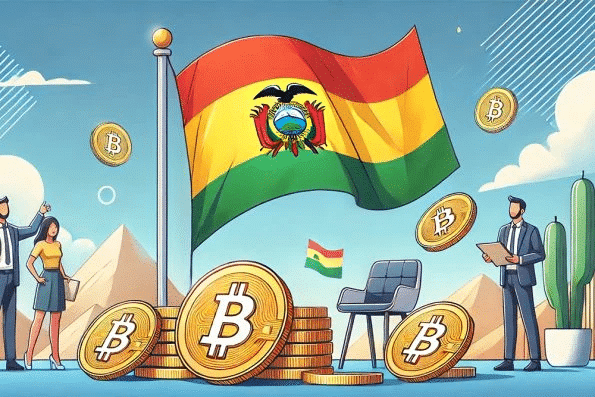Excitement erupted as the Bolivian president lifts cryptocurrency ban. The crypto community counts this as a win, a step in expanding crypto activities globally. Bolivia’s central bank, Banco Central de Bolivia, now permits financial bodies to conduct transactions in Bitcoin (BTC) and Ethereum (ETH). This action sets a clear path for modernising Bolivia’s payment system. As the Bolivian president lifts cryptocurrency Ban, investors have started to return, entering closed doors since 2014.
Bolivian President Lifts Cryptocurrency Ban Change in Regulatory Stance
End of the Ban
In the crypto update, Bolivia’s central bank, Banco Central de Bolivia, lifted the crypto ban, as the Bolivian president lifts cryptocurrency ban to help elevate the struggling country’s economy. Also, the action aligns the Bolivian laws with the general Latin American crypto regulations.
Prashant Jha, crypto-journalist at Cointelegraph, states that “the change in regulatory stance marks the end of a ban on crypto use in the country that began in 2014. The government prohibited banking entities from interacting with cryptocurrencies in December 2020 under Board Resolution N°144/2020.”
New Regulations
With the new regulations, banks and financial institutions can now transact in cryptocurrencies through authorised electronic channels. The laws are not flexible, as the community may want them, since cryptocurrencies are not accepted as forms of legal tender.
Cryptocurrencies can only be traded through banks; the Bolivian government does not regard them as legal tender, and companies are not obliged to accept them as payments for services or products.
The Economic and Financial Education Plan, published by the Banco Central de Bolivia, creates room for crypto awareness programs for the general public. This aims to educate the masses on the risks associated with cryptocurrency and dispel any myths surrounding digital assets. This is expected to help them manage Bitcoin (BTC), Ethereum (ETH) and other cryptocurrencies.
Implementation of the New Legislation
Government Collaboration
According to news sources, the Financial Investigations Unit, Financial System Supervisory Authority, and Central Bank collaborated to produce the new legislation. The crypto update on regulatory issues became effective on June 26.
Recent developments align Bolivia’s crypto regulatory framework with laws set by the Latin American Financial Action Task Force. This move counts as the adoption of crypto by a Latin American country in an attempt to boost its economy.
Latin America’s Pro-Bitcoin Stance
Economic Challenges
According to available data, economic indicators have shown that Latin American countries have struggled with a shaky economy at the brink of collapse. They are also facing rising inflation, which has forced them to look for nuanced ways to improve the economic situation in the region. Bitcoin and Ethereum have worked wonders for the economies of some Latin American countries, and thus, other countries are quickly adopting them as economic models.
Regional Adoption
El Salvador is a pioneering pro-crypto country in the Latin American landscape. It is the only region in the world that adopted Bitcoin (BTC) as a legal tender and the U.S dollar in 2021.
Regions like Mexico recognize the value of crypto transfers and payments but refuse to recognize any cryptocurrency as a legal tender. Every crypto profit incurred from cryptocurrency sales is taxed on centralised exchanges.
Brazil is another Latin American country with a direct crypto ban. Crypto adoption came along with income-tax regulations, and in 2023, a 15% tax was attached to all crypto profits.
The list of Latin American countries that are pro-Bitcoin (BTC) includes Argentina, where the president combats rampant inflation by following the steps of El Salvador.
Conclusion
Bolivia allows banks and authorised financial institutions to transact in Bitcoin (BTC), Ethereum (ETH), and other cryptocurrencies without a crypto ban. The country is following other Latin American countries by adopting flexible crypto laws in an attempt to boost its economy.
The fact remains that by embracing cryptocurrencies, Bolivia attracts investors. As the Bolivian President lifts cryptocurrency ban, it joins the crypto-pro league. The BIT journal is available 24/7, providing insights on the regulatory shifts and their impact on the economy of Bolivia and the broader cryptocurrency landscape in the country.





























